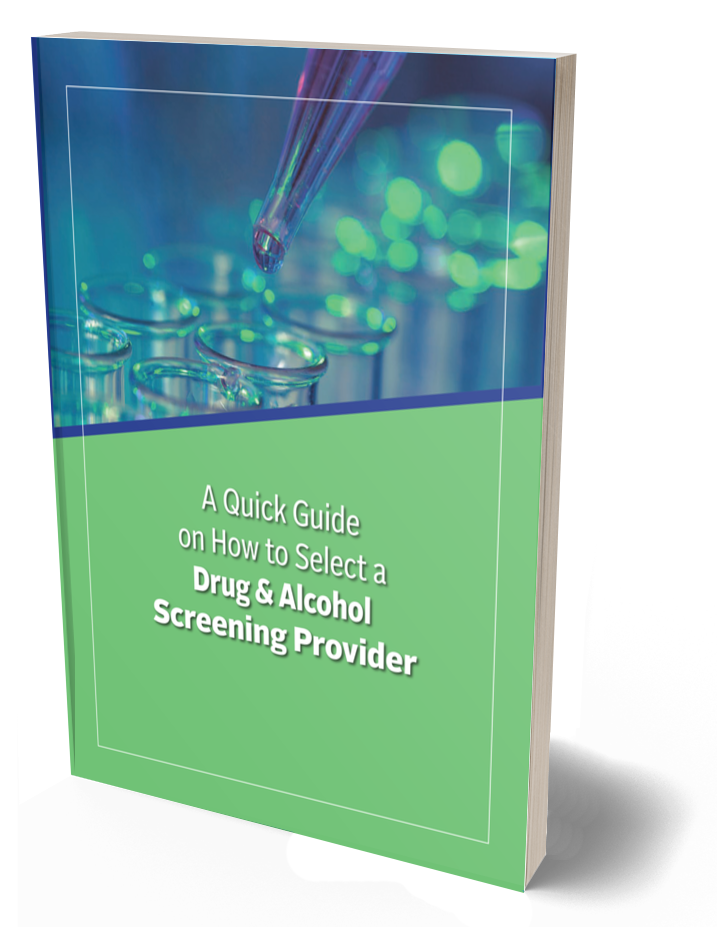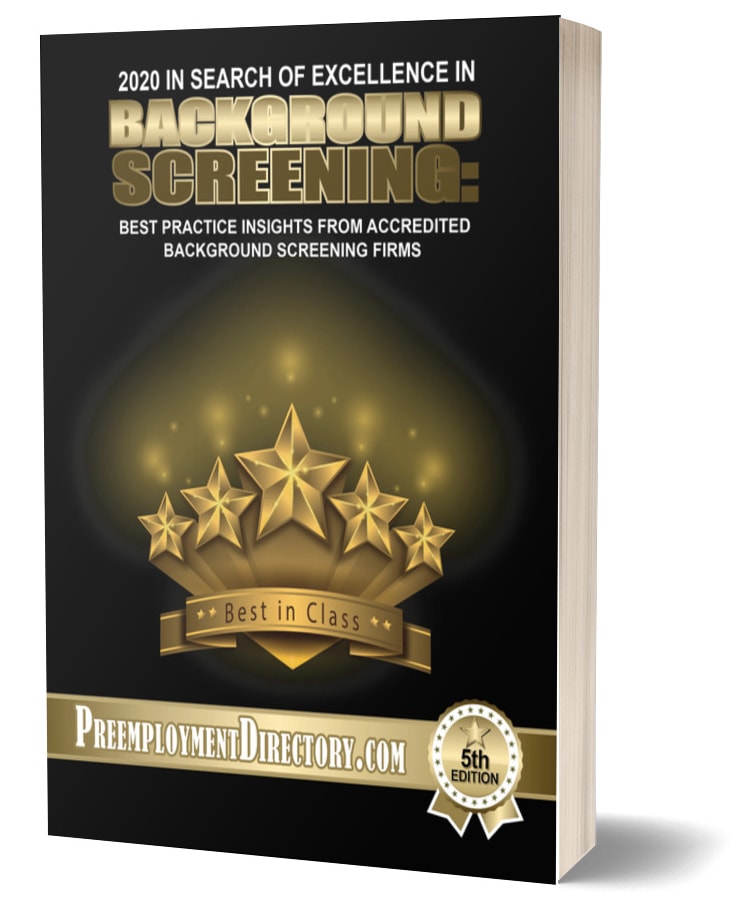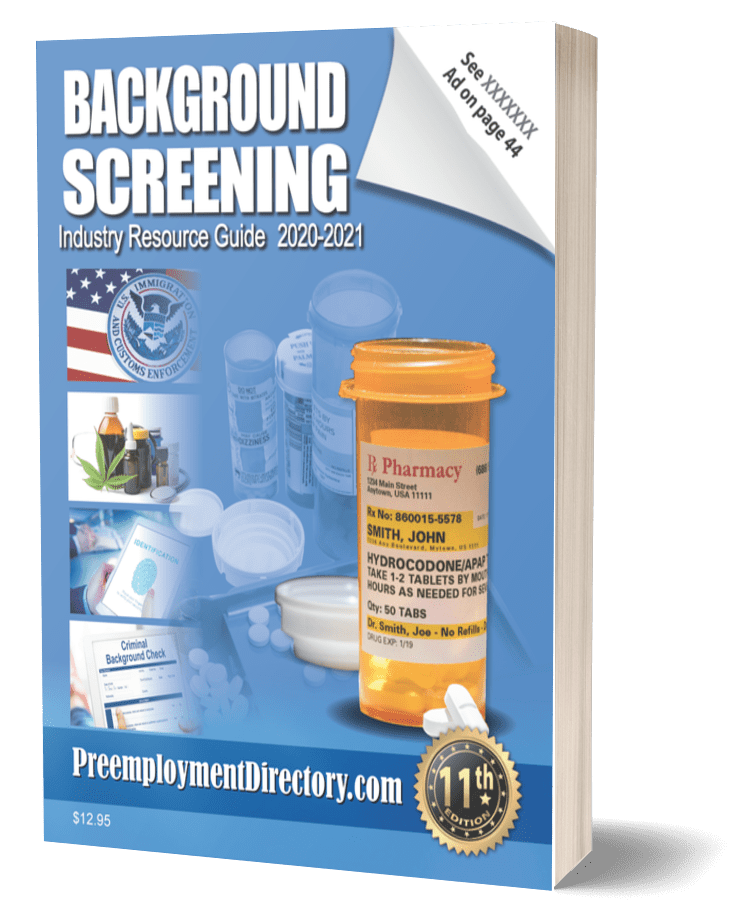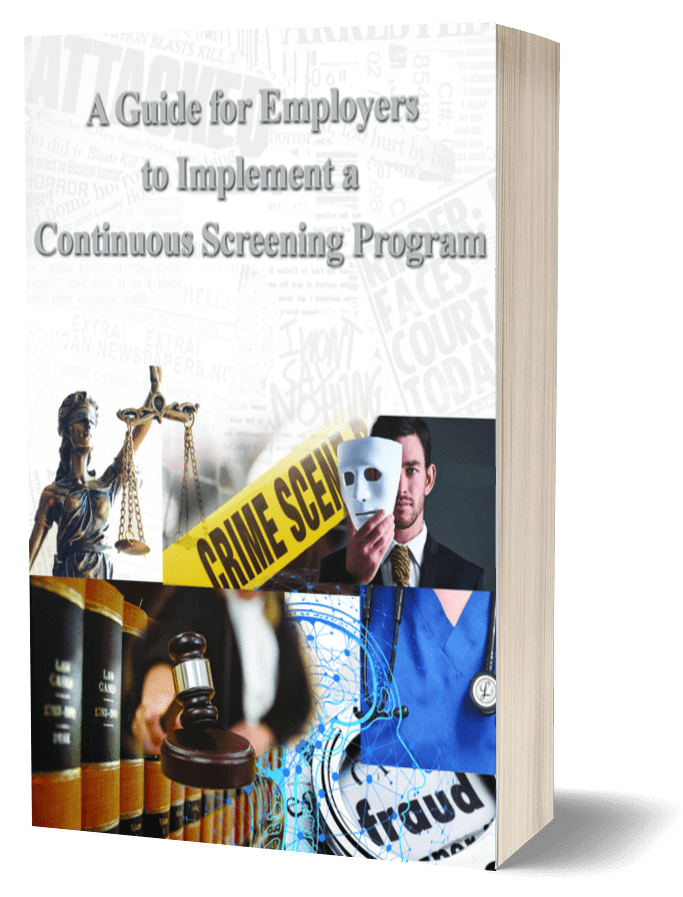Employment Screening Advice for Employers |

What is Employment Screening?
Employers use a series of steps to guide them towards hiring the best workers. Matching the right skills to an open position is key, and effective selection can result in hiring the kind of employees that will boost company morale, add to your corporate culture, keep turnover low and contribute to the growth of the organization.
The purpose of employment screening is to determine if an applicant is the right fit for the position. Determining if an applicant is the ‘Right fit’ encompasses evaluating and assessing the person in a number of areas:
- Does the person possess the prerequisite skills, knowledge, experience, competency, temperament, education, etc. to perform the requirement of the available position at the necessary level of proficiency?
- Does the person ‘fit’ with the team they will be working with?
- Does the person ‘fit’ with the company’s culture?
- Does the person have the willingness and capability to continue to learn, adapt and grow with the organization to continue to contribute to its organization’s success in the future?
- Does the person have the necessary level of integrity, meaning can he be trusted to manage the organization’s resources (people, financial, technology, and information resources)?
- Is the person likely to behave in an ethical manner that will not tarnish the firm’s reputation?
Employment Screening Articles
by Background Screening Expert W. Barry Nixon
DOT Drug Screening Reference Checking Guidance
By W. Barry Nixon, COO, PreemploymentDirectory.com
 The U.S. Congress passed the Omnibus Transportation Employee Testing Act in 1991 as an effort to keep the transportation industry free of drugs and alcohol. Since that time, DOT agencies have been required to implement drug and alcohol testing of safety-sensitive employees to maintain the safety of the public and workers.
The U.S. Congress passed the Omnibus Transportation Employee Testing Act in 1991 as an effort to keep the transportation industry free of drugs and alcohol. Since that time, DOT agencies have been required to implement drug and alcohol testing of safety-sensitive employees to maintain the safety of the public and workers.
DOT Rule 49 CFR Part 40 Section 40.25 Q&A provides guidance regarding reference checking requirements and responsibilities of employers seeking reference information and previous employers from who information has been requested.
What Does ‘Decisional’ Mean on a Background Check?
By W. Barry Nixon, COO, PreemploymentDirectory.com
 A ‘decisional’ background check occurs when an employer uses a hiring/decision or adjudication matrix. A hiring/decision matrix is a table or form with a list of criminal offenses that a company reviews to standardize which offenses require review. Adjudication is the process of evaluating the results of a job candidate’s background check against a company’s employment background checking policy. The adjudication process allows a company to identify qualified candidates that are ‘eligible’ for hire and decisional candidates.
A ‘decisional’ background check occurs when an employer uses a hiring/decision or adjudication matrix. A hiring/decision matrix is a table or form with a list of criminal offenses that a company reviews to standardize which offenses require review. Adjudication is the process of evaluating the results of a job candidate’s background check against a company’s employment background checking policy. The adjudication process allows a company to identify qualified candidates that are ‘eligible’ for hire and decisional candidates.
What Are the Key Factors in Identifying the Cost of Background Checks?
By W. Barry Nixon, COO, PreemploymentDirectory.com

Selecting the wrong candidate can lead to a slew of negative repercussions, including disruptive behavior, committing fraud or embezzlement, and workplace violence, but there is one step that can be taken to ensure the right hire is made: a background check. While the first question that might come to mind is “how much will this cost?” perhaps the most important aspect is how much the screening is worth to the organization. According to Rebekah Carenas in What’s the Real cost of a Bad Hire, it is the return on investment that should be a big factor in considering the value of a comprehensive background screening strategy. Even so, the process does come with a price tag, but three primary factors can help determine the potential cost of a background check: what information is sought, where the information for the background check is sourced from and the specific background screening company’s approach to pricing.
Effects of COVID-19 Pandemic on Employment
By W. Barry Nixon, COO, PreemploymentDirectory.com
 The economy has been greatly affected by the COVID-19 pandemic, which hasn’t just affected the healthcare industries but has caused businesses to close their doors and workers to become unemployed. Working from home has become the norm for many companies, causing a shift in the employment process, which is expected to evolve in the coming months and years. But working from home isn’t all it’s cracked up to be and many employees realize how much they took for granted daily connections and interactions. But, perhaps, one of the biggest positives created with the work-from-home movement has been the ability for employers to find talent anywhere, making it more flexible for everyone involved. In response, managers and leaders have adjusted their processes to manage employees, adopting new ways of communicating, managing performance, maintaining the company’s culture, and implementing policies and procedures. Remote work, however, hasn’t been possible for all employers and a Fortune survey has revealed that 59 percent of companies have deferred or froze employment and 25 percent have laid-off employees.
The economy has been greatly affected by the COVID-19 pandemic, which hasn’t just affected the healthcare industries but has caused businesses to close their doors and workers to become unemployed. Working from home has become the norm for many companies, causing a shift in the employment process, which is expected to evolve in the coming months and years. But working from home isn’t all it’s cracked up to be and many employees realize how much they took for granted daily connections and interactions. But, perhaps, one of the biggest positives created with the work-from-home movement has been the ability for employers to find talent anywhere, making it more flexible for everyone involved. In response, managers and leaders have adjusted their processes to manage employees, adopting new ways of communicating, managing performance, maintaining the company’s culture, and implementing policies and procedures. Remote work, however, hasn’t been possible for all employers and a Fortune survey has revealed that 59 percent of companies have deferred or froze employment and 25 percent have laid-off employees.
The New Frontier: Three Steps You Can Take to Improve Employment
By W. Barry Nixon, COO, PreemploymentDirectory.com
 The Covid-19 pandemic has caused employers across the country to adapt their processes for a remote workforce to ensure the right hire is made. There are three steps that employers can take to ensure better business operations and to improve employment hiring processes. New hiring techniques and background checks should include aptitude and integrity tests, panel interviews, video interviews, the use of artificial intelligence in screening resumes, online reference checks, and remote onboarding. It is equally important for employers to invest in training employees in time management to know how to manage distractions, ways to balance home and work duties, and key factors that will help them stay productive. Employees should also have access to counseling sessions to help them stay positive and healthy throughout the pandemic.
The Covid-19 pandemic has caused employers across the country to adapt their processes for a remote workforce to ensure the right hire is made. There are three steps that employers can take to ensure better business operations and to improve employment hiring processes. New hiring techniques and background checks should include aptitude and integrity tests, panel interviews, video interviews, the use of artificial intelligence in screening resumes, online reference checks, and remote onboarding. It is equally important for employers to invest in training employees in time management to know how to manage distractions, ways to balance home and work duties, and key factors that will help them stay productive. Employees should also have access to counseling sessions to help them stay positive and healthy throughout the pandemic.
Continuous Monitoring Helps You Manage The Risk Associated With Hiring Employees
By W. Barry Nixon, COO, PreemploymentDirectory.com
 Continuous monitoring or Post Hire Criminal Monitoring is the process of conducting on-going checking of records to have an almost real-time notification of arrest, updates of criminal records, and driving records. A Continuous Monitoring process alerts employers in close to real-time to criminal activity that their employees have been involved with. Instead of needing to periodically check on employee behaviors, you get this information on an on-going basis to aid you in being able to make informed management decisions to help you provide a safe work environment and protect your firm’s reputation. An effective continuous monitoring process should be a key component of your risk management program.
Continuous monitoring or Post Hire Criminal Monitoring is the process of conducting on-going checking of records to have an almost real-time notification of arrest, updates of criminal records, and driving records. A Continuous Monitoring process alerts employers in close to real-time to criminal activity that their employees have been involved with. Instead of needing to periodically check on employee behaviors, you get this information on an on-going basis to aid you in being able to make informed management decisions to help you provide a safe work environment and protect your firm’s reputation. An effective continuous monitoring process should be a key component of your risk management program.
At a Glance Some Key Employment Background Checks Employers Must Make
By W. Barry Nixon, COO, PreemploymentDirectory.com

Most employers conduct pre-employment background checks to help them hire the best talent for their business, to ensure they are providing a safe work environment, and to comply with legal requirements. Within this framework, each employer must select the specific types of employment background checks that will meet their unique hiring requirements.
Employers have numerous background screening options and this article discusses several types of employment checks that we believe are invaluable to helping you hire employees that will be successful on the job and to avoid making a bad hire.
Guest Post
Just What We Need: Another Article about the Future of Drug Testing
 Bill Current, Founder and Managing Partner for the Current Consulting Group
Bill Current, Founder and Managing Partner for the Current Consulting Group
A Look Back on 2020:
Results from Current Consulting Group (CCG) 2020 surveys:
- Interest in oral fluid testing increased in 2020.
- Telehealth collections came on the scene and caught on.
- COVID testing offered by TPAs became a thing.
- Overall drug testing volumes rebounded by the end of the year.
CCG is prepared to make the following predictions:
Oral fluid testing will retain its newly gained market share and possibly see another increase in 2021.
Specimen collections will continue to be a challenge for many employers and will only get more difficult.
First and foremost, CCG predicts that drug testing is still here to stay. There have always been challenges to the existence of the industry, but drug testing is far from the brink of extinction. Following are a few false “prophesies” floating around the industry that you should beware of:
- Pre-employment testing is doomed. False! In fact, nothing could be further from the truth. The significant increase in marijuana use that coincides with the legalization of pot in many states coupled with the dramatic increase in substance abuse overall since the start of the COVID-19 pandemic should put employers on high alert. Pre-employment drug testing has never been more important than it is in 2021 as literally millions of Americans seek jobs after spending months self-medicating their way through the stresses and strains caused by the pandemic.
- Employers should give in to the legalization of marijuana and accept the fact that marijuana users can be safe employees. Employees at work under the influence of drugs, with pot being the number one illicit substance of abuse, are still more likely to be involved in a workplace accident, file a workers’ compensation claim or cause property damage than their non-pot smoking coworkers. Respondeat superior and negligent hiring lawsuits will be on the rise for employers who fail to take seriously marijuana use among their employees.
- Marijuana is the only drug employers should be concerned about. That one is just downright silly.
Conclusion
Clearly, 2020 was not a normal year. The pandemic affected the drug testing industry significantly and while we may not be able to predict the future with certainty, we are likely never going entirely back to the way it was.
Employment Screening in the European Market: A Vastly Digitizing Landscape That is Becoming More Risk-Aware
By Sara Johnson, Marketing Communication Specialist, Validata
 The need for employment screening has increased significantly over the past year and a half. Due to the Covid-19 pandemic, many companies are increasingly working from home and subsequently, trying to digitize their hiring process. They need a better online onboarding and risk-management strategy, which has increased the need for (potential) employee background checks. Market-wide 28% of companies have revised or adapted their digital people strategy. Meanwhile, 48% haven’t yet but know they need to. In sectors such as software and telecom, employee screenings have climbed sharply.
The need for employment screening has increased significantly over the past year and a half. Due to the Covid-19 pandemic, many companies are increasingly working from home and subsequently, trying to digitize their hiring process. They need a better online onboarding and risk-management strategy, which has increased the need for (potential) employee background checks. Market-wide 28% of companies have revised or adapted their digital people strategy. Meanwhile, 48% haven’t yet but know they need to. In sectors such as software and telecom, employee screenings have climbed sharply.
Companies like the Amsterdam-based Validata Group specialize in online solutions for employment screening and have seen a great increase in demand for employment screening across Europe. However, because Europe is so culturally diverse, Validata has experienced differences in recruitment and onboarding strategies across the continent, different views on privacy legislation, data storage, and a diverse need for tools to manage hiring risks.
Are You Doing Enough to Screen Candidates for Counterproductive Work Behaviors? How to Improve Your Vetting Process
By Russ Law, Executive Vice President, Verensics
 Counterproductive Work Behaviors (CWB) costs businesses billions of dollars per year. For example, the Association of Certified Fraud Examiners (ACFE) found that companies lose 5% of their revenue every year due to fraudulent employee behavior. Is it worth courting that kind of financial loss because you are in a hurry to hire?
Counterproductive Work Behaviors (CWB) costs businesses billions of dollars per year. For example, the Association of Certified Fraud Examiners (ACFE) found that companies lose 5% of their revenue every year due to fraudulent employee behavior. Is it worth courting that kind of financial loss because you are in a hurry to hire?
Making a bad hire impacts more than just the bottom line. Allowing bad behaviors to go unchecked may result in decreased morale, higher turnover, and even legal action. No matter how tempting it may be to cut corners during the vetting process, it is never a good idea. It is far easier to weed out candidates likely to engage in CWB before they join your team. Doing so afterward is a costly and time-consuming process that comes with all kinds of challenges.
So, how can you prime your hiring process so that you do not find yourself with troublesome and costly employees on your team? Your organization needs to take pre-employment screening seriously, and you need to understand that vetting goes beyond the traditional background check.
Why We Need to Re-Screen Employees Now
By Sumit Sunil, Global Client Partner, Neeyamo Inc.
 According to the Crime Statistics Agency, family violence increased by 9.4 percent in 2020 to 92,521 in Victoria, anticipated by “family stresses.” In addition, drug offenses increased by 20 percent, sex offenses by 10.2 percent, and thousands of fines were issued for “breaches of health directives.” This “pressure cooker environment” has been created by COVID-19 lockdowns that have forced employees to work from home, and as employees are called back to work, employers may not know of any personal or criminal events that may have taken place. Criminal checks only reflect the police records at the time of release, so it’s important to regularly continue to re-screen employees who are part of an employer’s due diligence. Although the Australian Human Rights Commission prohibits discrimination on the basis of a criminal record, employers can try to prove that the inherent requirements are essential to the position.
According to the Crime Statistics Agency, family violence increased by 9.4 percent in 2020 to 92,521 in Victoria, anticipated by “family stresses.” In addition, drug offenses increased by 20 percent, sex offenses by 10.2 percent, and thousands of fines were issued for “breaches of health directives.” This “pressure cooker environment” has been created by COVID-19 lockdowns that have forced employees to work from home, and as employees are called back to work, employers may not know of any personal or criminal events that may have taken place. Criminal checks only reflect the police records at the time of release, so it’s important to regularly continue to re-screen employees who are part of an employer’s due diligence. Although the Australian Human Rights Commission prohibits discrimination on the basis of a criminal record, employers can try to prove that the inherent requirements are essential to the position.
What To Do When Social Media Becomes Problematic To The Workplace
By Bianca Lager, CEO, Social Intelligence
 Just in the last few years, social media firings have become commonplace in the pages of local and national news outlets. Horror stories of employees getting fired for singular tweets go viral, leaving many individuals curious about what an employer may find problematic. As an employer, Googling an employee or candidate might be tempting – after all, the info is right there. However, as the internet grows ever wider and social media platforms grow ever more complex, poking around yourself is not quite the simple task as it seems. There are boundaries you can document, communicate and enforce to uphold company values, morale productivity and avoid legal liability.
Just in the last few years, social media firings have become commonplace in the pages of local and national news outlets. Horror stories of employees getting fired for singular tweets go viral, leaving many individuals curious about what an employer may find problematic. As an employer, Googling an employee or candidate might be tempting – after all, the info is right there. However, as the internet grows ever wider and social media platforms grow ever more complex, poking around yourself is not quite the simple task as it seems. There are boundaries you can document, communicate and enforce to uphold company values, morale productivity and avoid legal liability.
Top Three Background Screening Trends Employers Can Expect In 2021
By Elizabeth Fitzell, Managing Director, Sterling RISQ
 As we adjust to more flexible workplaces and an increased acceptance of working from home or a mix of working from the office and home, the lack of regular in-person connection may mean fewer opportunities to spot issues with employees and to pick up on problems. Pre-employment background checks offer details at a static point in time whereas there will be a need to regularly know what’s happening with your employees. This is where continuous screening can fill the gap.
As we adjust to more flexible workplaces and an increased acceptance of working from home or a mix of working from the office and home, the lack of regular in-person connection may mean fewer opportunities to spot issues with employees and to pick up on problems. Pre-employment background checks offer details at a static point in time whereas there will be a need to regularly know what’s happening with your employees. This is where continuous screening can fill the gap.
In addition, the demand for gig workers has accelerated since the start of the pandemic, competition for gig jobs has also increased and competition often leads to an increase in embellishments and misrepresentations in applications.
Along with this, the increase in the use of AI offers significant efficiencies in terms of being able to trawl through large amounts of data at speed, and it also offers the opportunity to capture issues as they occur. Criminal offenses and media tracking can be assessed and monitored in real-time so that potential risks can be identified as early as possible and solutions developed to minimize risk.
Read more about the top three trends for 2021.
Why Employers Should Hire Slowly and Fire Quickly
By Attorney Lester S. Rosen, Founder, and CEO of Employment Screening Resources (www.ESRcheck.com)
 There are two critical mistakes employers can make when it comes to hiring and firing. First, many employers are in such a rush to hire that they make an offer to the best available candidate just to fill the position instead of waiting for the right candidate.
There are two critical mistakes employers can make when it comes to hiring and firing. First, many employers are in such a rush to hire that they make an offer to the best available candidate just to fill the position instead of waiting for the right candidate.
The other mistake is that employers are often too slow to fire. The fear of firing leads many employers to suffer through the long process of trying to make a bad hire work out. An employer or manager may feel that it is less trouble to put up with a bad employee than start the process of hiring a new one, or perhaps just does not want to deal with an uncomfortable situation or a hard conversation.
Are You Making These Employment Mistakes?
By Carlos Crameri, CEO, CuriousCheck
 Career Bright research shows that 74 percent of employers think they have hired the wrong candidate for a job position and that 2 out of 3 workers felt later that they were not a good fit for the job. Many employers make mistakes when making hiring decisions that lead to unsuccessful job hires. These include: skipping background checks, listing poor job descriptions, conducting an ineffective interview process, evaluating and hiring based on personality, hiring the right candidate for the wrong role, ignoring cultural fit, and not checking references.
Career Bright research shows that 74 percent of employers think they have hired the wrong candidate for a job position and that 2 out of 3 workers felt later that they were not a good fit for the job. Many employers make mistakes when making hiring decisions that lead to unsuccessful job hires. These include: skipping background checks, listing poor job descriptions, conducting an ineffective interview process, evaluating and hiring based on personality, hiring the right candidate for the wrong role, ignoring cultural fit, and not checking references.
Additional Employment Selection Resources for Employers

Be sure to get a copy of the Quick Guide to Selecting a Drug Screening
Provider.
Click here

Be sure to get a copy of ‘In Search of Excellence in Background Screening: Best Practice Insights from Accredited Background Screening Firms’
Click here

Be sure to get a copy of ‘2020-21 Background Screening Industry Resource Guide’
Click here

Be sure to get a copy of the ‘Employers Guide to Implementing a Continuous Screening Program’
Click here
Methods, Tools, and Processes Used in the Employment Selection Process:
- Resume Screening
- Reviewing resumes to determine at a macro level does the applicant has the necessary background to be considered for the position. Here are some of the information you can get from a resume while screening candidates.
- Organization skills (able to organize their thoughts into a cohesive and logical manner)
- Written Communication skills (possesses appropriate level or written communication skills to meet the job requirements, e.g., level of vocabulary, grammatical skills, spelling ability, level of mastery of English language.
- Previous work experience and/or education that matches stated job requirements.
- Interviews:
- Phone interviews are a good method to learn more about someone without hassling the candidate to come in and worry about commuting and missing out on their ongoing job.
- Video interviews are useful in helping to assess oral communications and listening presentation, and thinking skills.
- · One-way video interviews invite a candidate to videotape themselves answering a list of questions provided to them to respond to and to return to you. This way, the weight of the interview is on the candidate, while you can sit back and see what they have to say.
- In-person interviews are conducted face-to-face. This type of interview provides all the benefits of the other forms of interviews with the added value of being able to directly observe the applicant’s behavior and to have an engaging conversation with the person.
- Employment Tests
The following are the most common types of employment test:- Ability or Skill test
- Personality test
- Integrity test
- Polygraph test (illegal for employment purposes with a few select exceptions)
- Medical test (generally not permitted on a pre-hire basis)
- Pre-employment Background Screening is designed to verify the information supplied by a candidate on their resume and application. A background check is a process designed to verify that a job applicant is who they claim to be (identity verification), verification of the validity of the information submitted by a job applicant on the resume and application about their:
- criminal record history,
- sex offender registry check,
- education,
- credentials,
- employment history,
- salary history (where permitted by law),
- credit history checks (where permitted by law),
- motor vehicle driving record,
- immigration status (right to work in the U.S.) and
- International checks,
- other employment-related activities from the person’s past.
Notable background screening providers include Employment Background Investigations (EBI), Shield Screening, Candid Research, Nationwide Screening Solutions, National Applicant Screening (NAS), and Neeyamo.
- Reference Checks
Assessing an applicant’s previous job performance, on-the-job behavior, and cultural fit.
- Drug Screening
Drug Screening is a common practice that involves testing applicants for various types of illegal drug use using oral, urine, and hair samples. Drug testing firms like Orasure are used to determine the trustworthiness of prospective employees, avoid workplace injuries, and ensure that hires will be productive employees.
- Social Media Screening involves reviewing the online footprint of an applicant to gather additional information about the applicant’s behavior not typically available via the other forms of screening. In most cases, this practice is best conducted by a trusted outsourced firm such as Social Intelligence to shield the hiring organization from viewing information that may be potentially illegal to use in the hiring process.
- Temp to Hire or Paid Trial Projects are probably one of the most effective methods available to observe if an applicant has the necessary competencies and experience to actually perform a job while simultaneously assessing their ability to fit in with the team in the department they will be working and with organizations culture. There is no better assessment process than actually seeing the person performing the work. The primary limitation of this approach is that it is often not available to use with applicants that are currently employed.
- Job Simulation
A job simulation is an assessment process that involves assigning applicant tasks to perform to get an accurate assessment of their capabilities to perform the task. Job simulations can take many different forms, such as in-person assignments, online exams, take-home assignments, role-playing, presentations, or even virtual simulations. The following are some of the different types of job simulations:- In-basket exercises: The candidate is required to complete certain tasks such as responding to emails, taking phone calls, and handling grievances within a set amount of time. Often, these exercises are best for administrative and managerial positions.
- Situational judgment tests: The candidate is presented with a work-related scenario and is asked to use their judgment to provide a solution that can amicably resolve the situation at hand. These tests lend themselves well to positions such as customer service and supervisory roles.
- Work sample tests: These, typically hands-on tests, require the candidate to complete certain activities that are similar to actual tasks they would perform on the job. Examples include writing code, take-home assignments, collaborating with others to design a website, or completing an onsite construction task.
- Role-playing: Role-playing is probably the most common of all job simulation formats. These exercises help to evaluate a candidate’s ability to navigate interpersonal challenges in a work environment.

